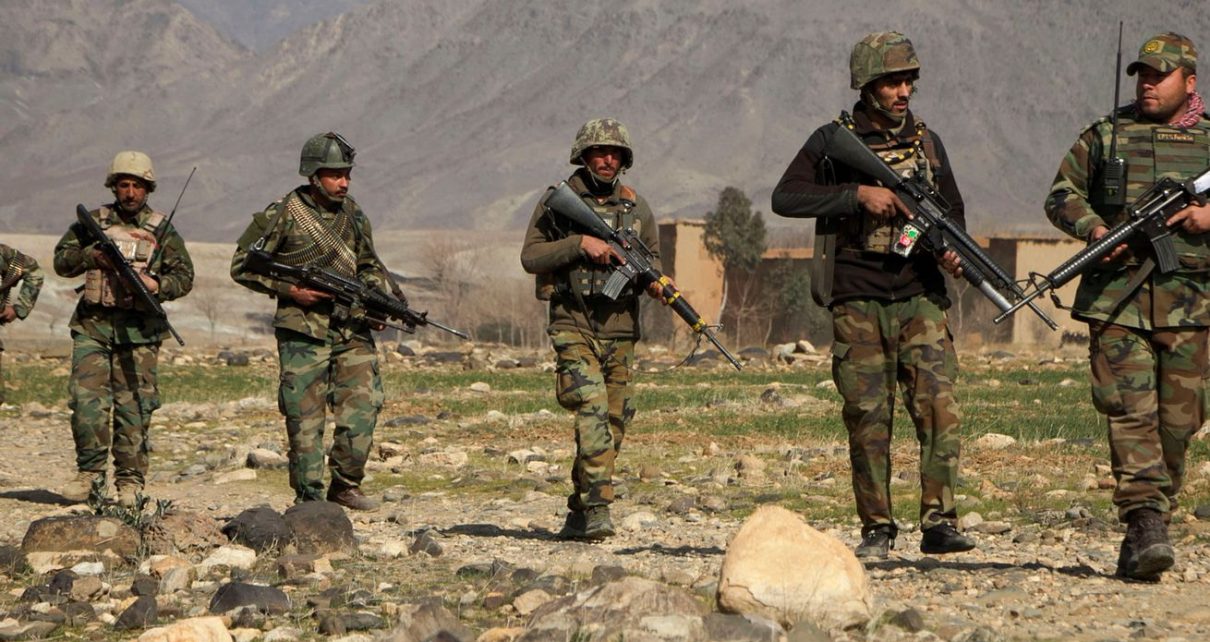
Biden can’t forever ignore the forever wars.
When President Joe Biden gave his first foreign policy address two weeks ago, he didn’t once mention the words “Iraq” or “Afghanistan.” But events in those two countries over the past 24 hours have offered a stark reminder to the administration that it can’t forever ignore America’s forever wars.
In Iraq, rockets seemingly launched by an Iranian-backed militia on Monday killed a non-American civilian contractor at a military base in Erbil. Nine others were injured, including four US contractors and one service member, according to Col. Wayne Marotto, the spokesperson for the US-led coalition against ISIS.
And in Afghanistan, the Taliban has closed in on major cities just a few months before the scheduled departure of US forces on May 1. The insurgent group released an open letter to Americans on Tuesday, basically asking the Biden administration to trust the Taliban to lead the nation and respect human rights after the troops leave — a dubious claim at best.
Even as Biden would prefer to spend most of his time addressing the coronavirus, China, and climate change, it’s clear that, like every president since George W. Bush, he’ll continually have his attention diverted toward Afghanistan and Iraq.
It’s not that he and his team have neglected those countries. Defense chiefs from NATO nations are meeting over the next two days in large part to discuss plans for Afghanistan and Iraq. The administration is also reviewing its policies in the two countries, weighing what to keep from the past four years and what to change.
But recent events have added an extra sense of urgency, with US troops under threat in an increasingly unstable Iraq, and a tough decision looming for the president in Afghanistan: leave the country to almost certain ruin, or stay and face another deadly fighting season against the Taliban?
In normal times, those would be tough issues for any administration to handle. In this era, they’re extra difficult.
“It does seem like the bandwidth for Afghanistan and Iraq is limited,” said Andrew Watkins, senior analyst for Afghanistan at the International Crisis Group. “It’s not that there’s no interest; it’s just that there are other priorities.”
Iraq “will put itself on the agenda”
Iran has long used its ties to Shia militia groups in Iraq, many of which are funded and directed by Tehran, to expand its influence in the country and thwart the US war effort there, including through attacks targeting US, Iraqi, and other international troops. Monday’s attack, then, was a lethal continuation of that standoff.
/cdn.vox-cdn.com/uploads/chorus_asset/file/22308403/1231195522.jpg) Safin Hamed/AFP via Getty Images
Safin Hamed/AFP via Getty ImagesIt’s unclear why the rocket attacks happened now. The most likely explanation experts have offered is that Iran is trying to pressure the US to lift sanctions on it and reenter the nuclear deal. Whatever the reason, the assault makes clear that Iraq remains a battleground between the US and Iran — meaning it will continue to be a problem for the Biden administration as long as US forces remain in the country.
“Iraq is going to keep rearing its head,” said Randa Slim, a senior fellow at the Middle East Institute in Washington, DC. “It will put itself on the agenda.”
Some analysts I spoke to said their hope is that the Biden team won’t view its Iraq policy solely as an extension of Iran policy. Indeed, beyond the Iranian proxy problem, Iraq is suffering from a deep governance crisis as millions go hungry due to a collapsing economy. Experts fear an Iraq in decline could prove fertile ground for ISIS’s resurgence.
For the moment, though, experts aren’t overly pleased by what they see from Biden’s team.
“During the Obama administration, [Iraq] policy was crafted to not aggravate Iran and sometimes work indirectly together, whether to guard the nuclear deal or fight ISIS, with little regard to Iraq itself,” said Rasha Al Aqeedi, senior analyst at the Newlines Institute for Strategy and Policy in DC. “Under Trump, Iraq was merely a front to confront Iran. It appears the Biden administration is readopting the former’s policy.”
“Not considering an independent Iraq policy has had an awful outcome” in the past, she concluded.
The White House didn’t respond to a request for comment. But the administration has been saying the right things, at least so far. A summary of a Tuesday call between Defense Secretary Lloyd Austin and his Iraqi counterpart noted that “the United States remains committed to supporting our Iraqi partners in their efforts to defend Iraq’s sovereignty” and the reaffirmation of the “strategic partnership” between the two countries.
But whether Biden can sustain the needed time and attention for such complicated, long-term problems in Iraq — with all that’s already going on in the world — remains an early question.
Afghanistan’s US troop-withdrawal deadline is fast approaching
By May 1, Biden must make a crucial decision: withdraw all 2,500 US troops from Afghanistan, or stay involved in the 20-year war?
Such a choice was forced on this administration by the last one. The US and the Taliban last February struck a deal: All American troops would leave the country by early May, and in the meantime the Taliban wouldn’t attack US or NATO coalition troops. Both sides have held their ends of the bargain, as roughly 10,000 service members have left the country while the US has suffered no combat deaths.
/cdn.vox-cdn.com/uploads/chorus_asset/file/22308406/1231073325.jpg) Xinhua/Saifurahman Safi via Getty Images
Xinhua/Saifurahman Safi via Getty ImagesBiden has promised to bring home US combat troops from Afghanistan, but he never committed to doing so right away, giving himself until the end of his first term. He also said he would still potentially keep a small US military presence in the country to continue counterterrorism operations against ISIS and al-Qaeda. That meant it was always possible Biden wouldn’t abide by the terms of the Trump-era deal.
His administration has signaled as much. In January, chief Pentagon spokesperson John Kirby said the Taliban’s violence against Afghans and continued ties to al-Qaeda cast doubt on America’s scheduled departure in May, and the New York Times reported this week that the Defense Department has requested more military options for the country — including an increase of troops.
Administration officials and experts tell me Biden’s team is deep into its Afghanistan policy review. Some worry, that it’s a plodding process that could run up to the May 1 deadline. “They seem pretty set on taking their time,” said the International Crisis Group’s Watkins. Meanwhile, two US officials told me the review is nearly complete, well ahead of schedule.
Still, that the review hasn’t wrapped may explain why the Taliban put out a letter Tuesday pressuring the US to get out sooner rather than later. “The Islamic Emirate of Afghanistan is aware of its obligations, other parties must also discharge their own obligations,” read the statement by Mullah Abdul Ghani Baradar Akhund, chief of the Taliban’s political office, using the group’s preferred name for its political organization.
Of course, Biden faces a near-impossible decision. If he commits to the withdrawal, many analysts fear the Taliban will exploit the resulting vacuum to push for another complete takeover of the country. The New York Times reports that the insurgent group has taken military outposts outside major cities like Kunduz and Kandahar, perhaps in preparation for such a fight.
But if Biden chooses to keep US troops in the country, it’s likely the US will see more Americans killed, adding to the 2,400 already lost since the US invaded the country in 2001. What’s more, violating the terms of the US-Taliban agreement might end any near-term chance for peace. “It could be a generationally defining moment in the Taliban where they decide talking isn’t worth it,” Watkins told me.
There are other issues that will come up during the NATO meeting this week, and discussions there might inform what Biden will do. But the looming deadline might be cause for the administration — and the president in particular — to prioritize Afghanistan policy more than it has already.





